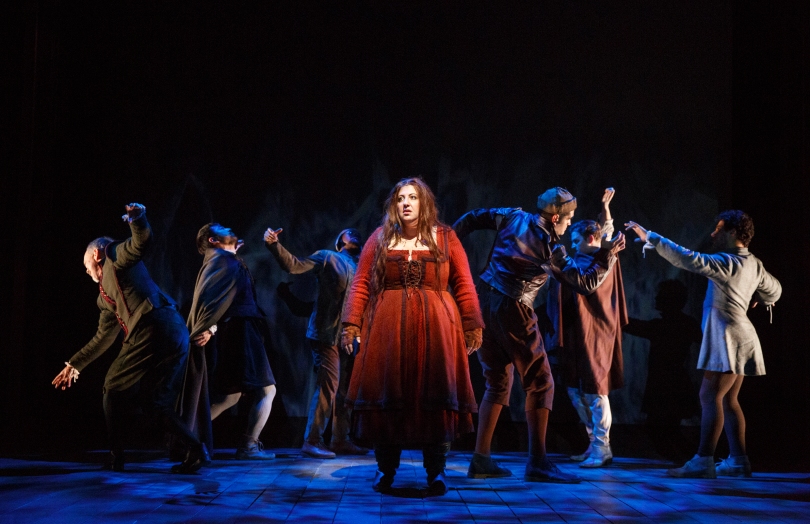
By Karen Isaacs
Sometimes I see a play, walk out perplexed, think about and end up still perplexed by the work. Imogen Says Nothing now at the Yale through Feb. 11 is just such a work.
It would be easy to dismiss it as “much ado about nothing” since the beginning of the play makes reference to that Shakespeare work.
But I keep trying to make sense of it – to understand fully the author’s point of view.
If you understand several things about this period, though they are not explained in the play, it can help you. Theater, including Shakespeare’s theater, was just one form of entertainment in Elizabethan England. It competed with other attractions that included bear and bull baiting and public executions.
Two, in one of the first folios (1600) of Shakespeare’s Much Ado About Nothing, early in the play, there is a stage direction that indicates that when Leonato, the Duke of Messina, enters, he is accompanied by his wife, Imogen. She never is mentioned nor appears later in the play and has no lines. In later editions, still under the supervision of Shakespeare, that stage direction is removed.
Third, there is a very famous stage direction in Shakespeare’s later romance, A Winter’s Tale. The direction says “exit bear.”
These three facts form the inspiration for this new play by Aditi Brennan Kapil and commissioned by Yale
We meet Imogen at the beginning of the play; she has come to London from a very small village to find Chris Saxton a map maker. It seems where her village (North Burcombe) should be he wrote Quaere. It has caused a number of complications.
What strikes you when first meeting Imogen, played marvelously by Ashlie Atkinson, is that she doesn’t look quite “right.” One of the actors calls her a “troll.” Her head projects forward and her shoulders are slumped.
She comes across some members of Shakespeare’s company – they are arguing about the desirability of printing their own folios to keep the money “in house” so to speak – and they tell her that the mapmaker is long since dead. But she joins the troupe as a behind the scenes person and even begins to develop a relationship with one of the actors.
She actually gets to go on stage which was unheard of. You may remember that all female roles were performed by younger boys. But in a production of Much Ado, the actor playing Leonato is so drunk someone needs to hold him upright on stage. The company grasps at that stage direction and has Imogen go on as “Imogen”.
This seems relatively straightforward even if Imogen seems to reason and think well beyond what you would expect of an uneducated person of the period.
But the play then goes off in some unusual directions which are both difficult to explain and would take away some of the surprise and pleasure in seeing it.
Let’s just say that we learn that Imogen isn’t exactly what we think she is and that bears held captive for the bear-baiting aren’t exactly how we think of them either.

First of all, Atkinson is terrific as Imogen. In her body, face and tone she conveys the plain, country girl with surprising flashes of intelligence and knowledge. In fact, in general the entire cast if very good, often being asked to play multiple roles. Christopher Geary and Ricardo Dávila play the actors who portray Beatrice and Hero. They are particularly upset when Imogen goes on stage. Christopher Grant is the drunk actor who plays Leonato, while Thom Sesma plays Burbage (Shakespeare’s leading actor) and Daisuke Tsuji plays Shakespeare.
The entire production is well directed by Laurie Woolery with particularly effective work by Haydee Zelideth (costumes) and fight direction by Rick Sordelet.
So what’s it all about? Woolery is using Imogen, the ghost character, to discuss the disenfranchised. If Imogen has no words to say, then it is easy to remove her and forget her. It is as if she does not exist. So any group that is not heard – figuratively or literally – does not really exist.
At the end of the play, Imogen says “It is a fearsome thing to be absent. To be void.”
Imogen Says Nothing is not my favorite play, but after pondering it for a while, its core idea is one that is relevant for today’s society. Particularly in an environment that seems to be silencing and therefore erasing people and ideas.
For tickets contact Yale Rep.
